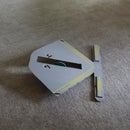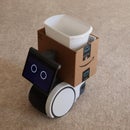Introduction: The Story, Santa's Shop 2016
It began by talking about ideas--then a pencil sketch on a yellow pad.
This techno/art installation was constructed through the collaboration of Mike and Annelle Rigsby, a husband/wife team. Mike, an electrical engineer, and Annelle, an artist, spent over 2000 hours creating this display. Ten Arduino microcontrollers and dozens of motors were combined with hundreds of 3d printed parts to make this happen.
Mike and Annelle are both authors and this project was created for the community to enjoy. Using clay, Annelle formed models for the Elf heads (and Santa), smaller elves, dozens of animals (riding the ferris wheel) and other parts. The clay models were 3d scanned, adjusted in size (or adapted to fit motor shafts), then 3d printed.
Annelle painted the figures and made the clothing. Servo motors (controlled by Arduino microcontrollers) allow the characters to “act” in a planned fashion. The “story” acted by the characters lasts about 3 minutes and is repeated.
Santa’s Shop will be on display daily this December, operating from 5 P.M. to 9 P.M. in the window at:
Brightway Insurance Agency; 9127 SW 52nd Ave, Gainesville FL 32608
Step 1:
The sketch was refined after considering what would fit and what we had the skills to construct.
Step 2:
This is an elf head that Annelle made using clay. It is on a 3d scanner to be converted into a digital file. That file can be resized and hollowed out to make room for a motor attachment, then printed using a 3d printer.
Step 3:
A body was printed, then motors were added.
Step 4:
Motors were added for the arms and hands were attached at the end of the arms. Wires are brought out the back.
Step 5:
The hollow part of an elf head (seen from the neck end) slides over a motor. The elf was dressed (custom made clothing) and wires brought out to an Arduino.
Step 6:
Santa is similar to an elf, but he has longer legs, boots and a larger stomach.
Step 7:
Drum sticks were 3d printed and assembled, as was the drum. Two electromagnets are hidden inside the drum.
Step 8:
The drum is assembled, then painted.
Step 9:
The boxes at the rear of the display are made using wood and a curved (3d printed) roof.
Step 10:
The display is starting to shape up.
Step 11:
On the left is my view (engineering perspective) of an elf head. The right side is Annelle's (artist) interpretation.
Step 12:
This is an automated "Wheelo" using an Arduino microcontroller, servo motor and ultrasonic transducer.
Step 13:
These are pieces assembled for the elf swing.
Step 14:
The elf was formed in clay, scanned and 3d printed.
Step 15:
The head was painted.
Step 16:
Clothes were made, then arms and legs inserted in body holes (the body holes were designed in the digital file, then 3d printed).
Step 17:
Finishing touches are added to the elf. There are twelve of these characters (each with a different face) in the display.
Step 18:
One elf wound up on the swing.
Step 19:
The display is progressing.
Step 20:
Work tables that flip from a "work" to "play" mode were 3d printed.
Step 21:
Elfis was assembled and wired up.
Step 22:
The automated "Wheelo" gets a face and decorations.
Step 23:
The "Naughty and Nice" list, signs, elves and props are assembled on a shelf.
Step 24:
A wagon was designed, 3d printed and painted.
Step 25:
A train track up in the air has been added.
Step 26:
Santa is assembled, dressed and his controller wired.
Step 27:
Drinking birds (without water) are made to bob by heating their posteriors.
Step 28:
Tools formed from clay (baked and painted) were added to the table--food was added on the play side of the table.
Step 29:
Wiring is getting more intense.
Step 30:
The roof is starting to take shape.
Step 31:
Lights are added to the ceiling.
Step 32:
The fake stained glass was designed by Annelle, lead glued to glass then filled with colors. Lights were added around the inside edge of the frame, then it was powered up.
Step 33:
Special mounts were designed and 3d printed for the bubble lights along the top rear of the display.
Step 34:
A bear was designed in clay, 3d scanned, then printed hollow to accept a light. The bear was painted and placed on a specially designed, 3d printed stool.
Step 35:
A reindeer in an airplane was designed in clay, scanned, sized and 3d printed--then painted. It was placed on a magnetic levitating platform so that it "floats" in the air.
Step 36:
Mike is working on some of the wiring in the back.
Step 37:
Mostly finished (something always gets changed) we are at the end.
For more details on the construction (3d files, software sketches, etc.) go to




